新起点四年级下册英语句型汇总
小学四年级英语下册《1-2单元重点句型汇总》,寒假看一看

四年级英语下册《1-2单元重点句型汇总》寒假看一看Unit 1 Welcome to my new home!【句型】1. Welcome to my new home. 欢迎来到我的新家。
2. Look at my bedroom. 看看我的卧室。
3. There is a new bed. 有一张新床。
4. And there's a new desk and a new chair. 还有一套新桌椅。
5. There are two sofas and four armchairs.有两个沙发和四个手扶椅。
6. Look! Here's a new table. 看!有一个新桌子。
7. Look! What's in my study? There is a new computer.看!我书房有什么?哇!有一台新电脑。
8. This is the living room. 这是客厅。
9. That's the bathroom. 那是浴室。
四年级英语下册《1-2单元重点句型汇总》寒假看一看Unit 2 There are forty students in our class.【句型】1. Good afternoon, boys and girls! 下午好,男孩女孩们!2. —How many students are there in your class? 你们班有多少学生?—Twenty-nine.二十九个。
3. Let's count from 1 to 29! 让我们从1数到29。
4. Welcome to our class! 欢迎来我们班。
5. —How many teachers are there in your school? 你们学校有多少老师?—There are fifty.五十名。
6. —How about your school? 你们学校呢?—There are sixty teachers in our school. 我们学校有六十名老师。
新起点四年级下册句型

Starting Line 4 (B)Unit 9My Community1.Where is the hospital?医院在哪里?It's next to the hotel.它在酒店旁边。
2.How can I get to the newspaper stand?到报刊亭怎么走?Go straight and turn left at the second crossing.It's on your left.一直走,在第二个十字路口左转。
就在你的左边。
Unit 10My City3.What are you going to do this weekend?这个周末,你打算做什么?I'm going to Tian'anmen Square with my friends.我打算和朋友一起去天安门广场。
4. What do you want to do there?你想在那做什么?I want to fly a kite.我想去放风筝。
5.Have you ever been there?你去过那里吗?Yes, I have./ No, I haven't.是的,我去过。
/不,我没去过。
6.Is there a museum in your city?你所在的城市有博物馆吗?Yes, there is./ No, there isn't.Unit 11Peoples and Countries7.Where do you come from?你来自哪里?I come from Canada.我来自加拿大。
8.Where do you live?你住在哪里?I live in Toronto.我住在多伦多。
9.What is it famous for?它以什么而闻名?It's famous for CN tower.它以CN塔而有名。
人教新起点英语四年级下册各单元重点知识总结

人教新起点英语四年级下册各单元重点知识总结Unit 1重点知识汇总一、单元词汇across from对面next to紧邻restaurant餐馆post office邮局XXXgrocery食品杂货店turn left向左转turn right向右转go straight直行crossroads十字路口XXX街坊;附近send寄;发送get得到money钱get to到达XXX离开toy玩具XXXXXXXXXsupermarket超市ball球二、单元句型1.A: Excuse me。
Where is the hospital?对不起。
医院在哪里?B: Go straight。
It s on your right。
It s next to the restaurant.直走。
它在你的右侧。
它紧邻餐馆。
2.A: Excuse me。
How can I get to the post office?对不起。
我如何到达邮局?B: Go straight and turn left at the first crossroads.It s XXX.直走,在第一个十字路口左转。
它在书店和食物杂货店之间。
3.A: Where is the bank?银行在哪儿?B: It s een the supermarket and Sunday Park.它在超市和星期天公园之间。
4.A: Excuse me。
Is there a post office in the neighbourhood?对不起。
在附近有邮局吗?B: Yes。
there is.是的,有。
5.He goes straight and turn left at the second crossroads.他直走,在第二个十字路口左转。
6.XXX.他看到银行紧邻着餐馆。
7.Then XXX.然后他看到餐馆对面有一个玩具店。
三、四会单词和四会句型对不起。
人教版小学英语新起点 四年级下册Unit4 第四单元知识点精析
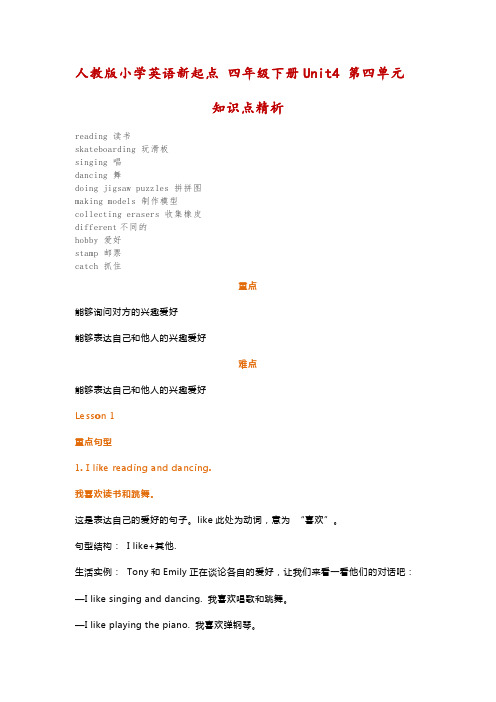
人教版小学英语新起点四年级下册Unit4 第四单元知识点精析reading 读书skateboarding 玩滑板singing 唱dancing 舞doing jigsaw puzzles 拼拼图making models 制作模型collecting erasers 收集橡皮different不同的hobby 爱好stamp 邮票catch 抓住重点能够询问对方的兴趣爱好能够表达自己和他人的兴趣爱好难点能够表达自己和他人的兴趣爱好Lesson 1重点句型1. I like reading and dancing.我喜欢读书和跳舞。
这是表达自己的爱好的句子。
like此处为动词,意为“喜欢”。
句型结构:I like+其他.生活实例:Tony和Emily正在谈论各自的爱好,让我们来看一看他们的对话吧:—I like singing and dancing. 我喜欢唱歌和跳舞。
—I like playing the piano. 我喜欢弹钢琴。
2. like的用法(1)like作动词,意为“喜欢”,有对某人某事或某物赞许或产生兴趣的含义。
① like sb./ sth.意为“喜欢某人/某物”。
例:I like apples.我喜欢苹果。
②like与动名词连用,即like doing sth.,在意义上相当于enjoy doing sth.,意为“喜欢做某事”,表示经常性的习惯或爱好。
例:I like singing very much.我非常喜欢唱歌I don't like drawing. 我不喜欢画画。
③like与动词不定式连用,即like to do sth.,意为“喜欢做某事”,表示具体的一次行为。
He likes to playfootball at weekends. 他喜欢在周末踢足球。
(2)like 作介词,意为“像”。
例:He looks like hisfather.他看起来像他的爸爸。
人教版新起点四年级下册英语 知识汇总梳理

【目录】一、词汇汇总1.1 单词1.2 词组二、语法总结2.1 动词时态2.2 介词短语三、阅读理解3.1 短文阅读3.2 阅读练习四、句型梳理4.1 常用句型4.2 句子练习五、听力技巧5.1 听力训练5.2 听力练习【正文】一、词汇汇总1.1 单词在人教版新起点四年级下册英语中,学生需要掌握一定量的单词,包括日常生活中常见的动物、食物、家庭成员等,如cat, dog, apple, banana, father, mother等。
这些单词贴近学生的生活实际,有利于他们的记忆与理解。
1.2 词组适当引导学生掌握一些日常用语和常见短语也是必不可少的。
学会问候语hello, goodbye;描述天气的短语如It's sunny, It's rainy;表达时间的短语如What time is it?等。
二、语法总结2.1 动词时态在四年级下册的英语学习中,学生开始接触一些基础的动词时态,如一般现在时和一般过去时。
这些时态的掌握对于学生成长后期的语言学习打下了重要的基础。
通过反复的练习和对生活中实际场景的运用,学生可以更快地掌握动词时态的用法。
2.2 介词短语介词短语也是英语语法中的重要组成部分之一。
学生需要学会运用一些基础的介词短语,如in the park, on the table, at school等。
这些短语的正确使用可以丰富学生的语言表达,并提高他们的口语交流能力。
三、阅读理解3.1 短文阅读四年级下册的英语教学中,学生需要有一定的阅读能力。
教师需要选取适合学生水平的短文材料,让学生在阅读中逐渐理解语言,提高阅读理解能力。
短文内容可以包括日常生活场景、动物故事等,寓教于乐,激发学生的学习兴趣。
3.2 阅读练习为了检验学生的阅读理解能力,可以设计一些练习题目,包括问题回答、句子翻译等。
通过这些练习,可以帮助学生巩固所学知识,提高他们的语言应用能力。
四、句型梳理4.1 常用句型在四年级下册的英语课程中,教师需要引导学生掌握一些基础的句型,比如询问句、陈述句和祈使句等。
人教(新起点)小学英语四年级下册Uni4Hobbies知识点总结及巩固练习
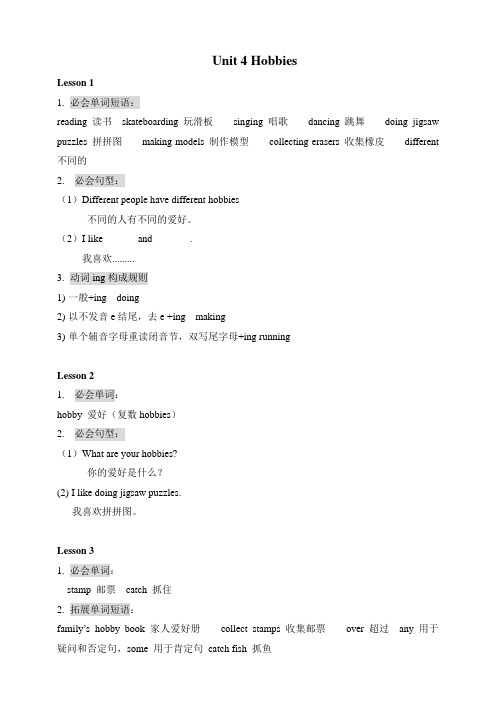
Unit 4 HobbiesLesson 11.必会单词短语:reading 读书skateboarding 玩滑板singing 唱歌dancing 跳舞doing jigsaw puzzles 拼拼图making models 制作模型collecting erasers 收集橡皮different 不同的2.必会句型:(1)Different people have different hobbies不同的人有不同的爱好。
(2)I like ______ and _______.我喜欢.........3.动词ing构成规则1)一般+ing doing2)以不发音e结尾,去e +ing making3)单个辅音字母重读闭音节,双写尾字母+ing runningLesson 21.必会单词:hobby 爱好(复数hobbies)2.必会句型:(1)What are your hobbies?你的爱好是什么?(2)I like doing jigsaw puzzles.我喜欢拼拼图。
Lesson 31.必会单词:stamp 邮票catch 抓住2.拓展单词短语:family’s hobby book 家人爱好册collect stamps 收集邮票over 超过any 用于疑问和否定句,some 用于肯定句catch fish 抓鱼Let’s spellng [ŋ]listening 听running 跑king 国王sing 唱歌ring 戒指song 歌曲long 长的ping-pong 乒乓球Fun timeplay the guitar 弹吉他after school 放学后famous music stars 著名的音乐明星in the future 在将来like+doing 喜欢做某事difficult—easy 难的—简单的special 特别的collect spiders 收集蜘蛛dangerous—safe 危险的—安全的ride my unicycle 骑我的独轮车practice 练习have practiced 现在完成时Story timemany +可数名词复数许多hobby (hobbies)爱好play football 踢足球paint 画画be good at +n / doing 擅长…messy 脏乱的sing songs 唱歌in English 用英语sticker 粘贴collection 收藏品练习题( ) 1. It's not ________to ride a unicycle. Peter has practiced a long time.A. difficultB. coolC. easy( ) 2. I’m afraid of spiders, so I don't want to play_______them.A. ofB. withC. in( ) 3. I like_______ . I go to a music school to learn it.A. playing the guitarB. playing guitarC. play guitar ( ) 4. Different people have different________.A. hobbyB. hobbys C hobbies( ) 5. Put_______ your backpack and see the world.A. onB. forC. to( ) 6. Cherry likes collecting watches. He has________ 20 watches.A. upB. moreC. over( ) 7. Tim likes drawing, but he is not good_________it.A. atB. inC. with( ) 8.My father often goes fishing but he never______ any fish.A. catchsB. catchingC. catches( ) 9. Can I _____ a question?A.asksB. askC. asking( ) 10. ---- ________ are your hobbies?--- I like dancing.A.HowB. WhatC. Where答案:ABACA CACBB。
新起点四年级下册英语句型汇总

新起点四年级下册常用英语句型汇总注意:画线部分的单词需能够替换单元内其他单词!Unit 9: My community单词:community building bank grocery store drugstore bookstore police station gas station coffee shop across from next to between cinema newspaper stand bakery turn left park hairdresser's restaurant zoo go straight turn right句型:1. Where is the bookstore?It’s next to / across from the bank.It’s between the bakery and the restaurant.2. Excuse me. How can I get to the bakery?Go straight. Turn right at the first crossing. It’s on your left.Unit 10: My city单词:Place Things to do:stadium watch a soccer matchmuseum see dinosaursuniversity visit the library department store buy a skateboardTian’anmen Square fly a kitegallery see an art show句型:1. Is there a park in your city?Yes, there is. / No, there isn’t.2. What are you going to do this weekend?I’m going to Tian’anmen Square with my friends.3. What do you want to do there?I want to fly a kite.Unit 11: Peoples and Countries单词:Country City Be famous forChina Beijing Tian’anmen SquareJapan Tokyo Cherry blossomCanada Toronto CN Tower United States Los Angeles Disneyland France Paris Eiffel Tower United Kingdom London Big Ben Australia Sydney Opera House句型:1. Where do you come from?I come from China.2. Where do you live?I live in Beijing.3. What is your city famous for?It’s famous for the Great Wall.4. Where does Isuzu come from? Where does Edward come from? She comes from Japan. He comes from Canada.5. Where does she live? Where does he live?She lives in Tokyo. He lives in London.Unit 13: Travel Plans单词:Place Things to do Transportation Beach (Hainan) swim By planeMount Tai see the sunrise By trainShaolin Temple learn Wushu By trainWest Lake take pictures By trainSafari park see wild animals By busThailand see elephants By shipKunming see a flower show By planeTibet see the Buddha Palace By plane句型:1. Where do you want to go this summer vacation?I want to go to Shaolin Temple with my parents.2. What do you want to do there?We want to learn Wushu there.3. How do you want to go there?By train.Unit 14: My Hobby单词:hobby read stories play computer games paint pictures collect dolls keep a diary collect stamps collect stickers knit sew make models collect coins play chess travel hike句型:1. What’s your hobby?My hobby is read ing stories.2. What do you think of it?I think it’s fun.3. What’s your mother’s hobby? What’s your father’s hobby? Her hobby is sing ing songs. His hobby is play ing chess.4. What does she/he think of it?She/He thinks it’s exciting.Unit 15: Communication单词:make a phone call send an e-mail send a short message write a letter mail a postcard pay phone cell phone句型:1. Do you often write letters to your friends?Yes, I do. / No, I don’t.2. May I speak to Peter, please?This is Peter speaking.3. Would you like to go to the park with me?Sure.4. I want to send an e-mail to my friends.。
新起点英语1-6年级句型
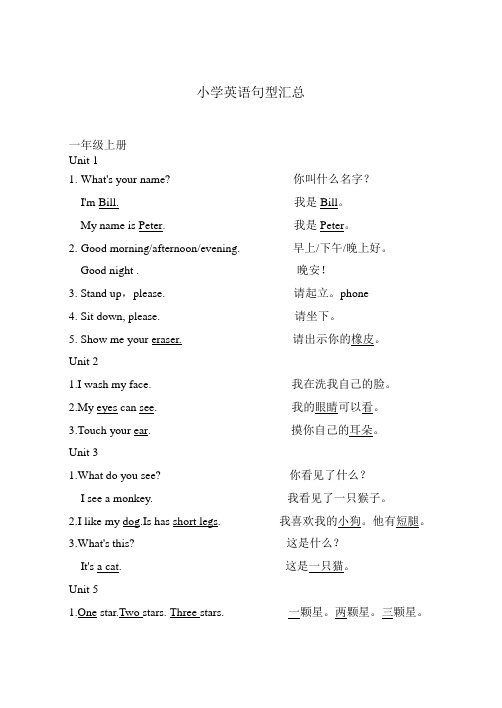
小学英语句型汇总一年级上册Unit 11.What's your name? 你叫什么名字?I'm Bill. 我是Bill。
My name is Peter. 我是Peter。
2.Good morning/afternoon/evening. 早上/下午/晚上好。
Good night . 晚安!3. Stand up,please. 请起立。
phone4. Sit down, please. 请坐下。
5. Show me your eraser. 请出示你的橡皮。
Unit 21.I wash my face. 我在洗我自己的脸。
2.My eyes can see. 我的眼睛可以看。
3.Touch your ear. 摸你自己的耳朵。
Unit 31.What do you see? 你看见了什么?I see a monkey. 我看见了一只猴子。
2.I like my dog.Is has short legs. 我喜欢我的小狗。
他有短腿。
3.What's this? 这是什么?It's a cat. 这是一只猫。
Unit 51.One star.Two stars. Three stars. 一颗星。
两颗星。
三颗星。
2.How old are you,Lily? 你几岁了,Lily?I'm six. 我六岁。
3.What's your phone number? 你的电话号码是多少?62875941. 62875941。
Unit 61.What colour do you like? 你喜欢什么颜色?I like yellow. 我喜欢黄色。
Unit 71.May I have two apples,please? 可以给我两个苹果吗?Sure.Here you are. 可以。
给你。
2.What fruit do you like? 你喜欢什么水果?I like apple. 我喜欢苹果。
人教版新起点英语(一年级起点)四年级上、下册单词和句型

人教版新起点英语(一年级起点)四年级上单词和句型Unit 1running 跑步basketball 篮球roller skating 滑旱冰jumping rope 跳绳ping-pong 乒乓球What about...? ……怎么样?interesting 有趣的often 经常be good at 擅长late 晚swim 游泳friend 朋友father 父亲get up 起床Unit 2visit one's grandparents 看望(外)祖父母go to a drawing club 去绘画俱乐部climb a hill 爬山pick fruit 采摘水果play computer games go fishing 钓鱼go to the cinema 看电影on the weekend 在周末fun 有趣的always 总是step 踏;踩paint 颜料evening 傍晚;黄昏dirty 脏的their 他们的house 房子poor 可怜的hope 希望so 那么Saturday 星期六near 靠近day 白天Unit 3 usually 通常by bus 乘公交车by boat 乘小船by ship 乘轮船by car 乘小汽车by taxi 乘出租车by bike 骑自行车on foot 步行by school bus 乘校车by subway 乘地铁by plane 乘飞机by train 乘火车garden 花园meeting place 集合地点gate 大门transportation 交通film 电影earth 地球snow 雪theatre 剧场come 来enjoy 欣赏park 公园apple 苹果Unit 4 pen 钢笔knife 小刀eraser 橡皮crayon 蜡笔scissors 剪刀glue stick 胶棒paper 纸use 使用please 请find 找到Information Centre 咨询中心Excuse me. 对不起,打扰一下phone 电话dad 爸爸hamburger 汉堡包ruler 尺子pencil 铅笔schoolbag 书包shop 商店Unit 5climb on the window ledge 爬窗台dangerous 危险的play with fire 玩火Be careful! 当心run down the stairs 跑下楼梯sidewalk 人行道wait for 等待safe 安全stop 停street 街道safety rule 安全规则green 绿色的red 红色的play football 踢足球Unit 6 nurse 护士cook 厨师doctor 医生bus driver 公交司机police officer 警官taxi driver 出租司机farmer 农民worker 工人in the future 将来great 好极了job 工作sick 有病的people 人们teach 教just 只是myself 我自己sound 听起来Monday 星期一Tuesday 星期二Wednesday 星期三Thursday 星期四Friday 星期五teacher 老师Unit 1Andy: Do you often play basketball?Mike: Yes, I do.Andy: Are you good at it ?Mike: Yes, I am. Sue, do you often play basketball?Sue: No, I don’t. I often play ping-pang.Unit 2Yaoyao: Wow! Binbin, look! That is a big apple!Binbin: Here you are! Do you often pick fruit on the weekend?Yaoyao: Yes, I do. What do you do on the weekend?Binbin: I often go to a drawing club. It’s fun.Unit 3Andy: Hi, Sue!Sue: Hi, Andy!Andy: How do you usually go to school?Sue: I usually go to school on foot. My home is near our school. What about you? Andy: I usually go to school by subway.Unit 4Bill: Hi, Andy. Can I use your glue stick, please?Andy: Sorry. I’m using it.Bill: That’s OK. Hi, Lucky. Can I use your glue stick?Lucky: Sure. Here you are.Unit 5Father: Be careful ! Use the sidewalk.Daughter: OK!Policeman: Please wait for the green light. It’s safe.Man: OK! Thank you.Unit6Binbin: I want to be a doctor in the future. What do you want to be? Yaoyao: Oh! I want to be nurse.Binbin: That’s great.人教版新起点英语(一年级起点)四年级下单词。
四年级下册英语书新起点
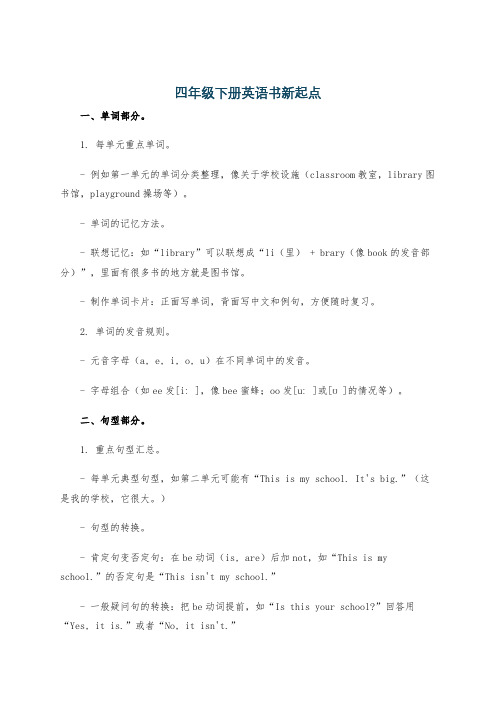
四年级下册英语书新起点一、单词部分。
1. 每单元重点单词。
- 例如第一单元的单词分类整理,像关于学校设施(classroom教室,library图书馆,playground操场等)。
- 单词的记忆方法。
- 联想记忆:如“library”可以联想成“li(里) + brary(像book的发音部分)”,里面有很多书的地方就是图书馆。
- 制作单词卡片:正面写单词,背面写中文和例句,方便随时复习。
2. 单词的发音规则。
- 元音字母(a, e, i, o, u)在不同单词中的发音。
- 字母组合(如ee发[iː],像bee蜜蜂;oo发[uː]或[ʊ]的情况等)。
二、句型部分。
1. 重点句型汇总。
- 每单元典型句型,如第二单元可能有“This is my school. It's big.”(这是我的学校,它很大。
)- 句型的转换。
- 肯定句变否定句:在be动词(is, are)后加not,如“This is my school.”的否定句是“This isn't my school.”- 一般疑问句的转换:把be动词提前,如“Is this your school?”回答用“Yes, it is.”或者“No, it isn't.”2. 句型的运用场景。
- 在描述事物、介绍人物等场景中的应用。
例如在介绍自己的朋友时可以用“He/She is...”句型。
三、语法部分。
1. 一般现在时(be动词形式)- 主语为第一人称单数(I)用am;主语为第三人称单数(he/she/it)用is;主语为复数(we/you/they)用are。
- 练习:用正确的be动词填空,如“I_____a student.”(am)。
2. 名词的单复数。
- 规则变化:一般在名词后加 -s(books),以s, x, ch, sh结尾的加 -es (boxes)等。
- 不规则变化:如man - men,woman - women等,通过例句和练习加深理解。
英语四下课本重点句型

1.This is Xiaoyong. He’s very clever.2.This is Maomao. She’s very nice.3.This is Ms Smart. She’s a nice teacher.4.This is Pa rrot. It’s a very naughty bird.1.He’s a bit shy.2.He is very nice.3.She’s clever.4.They are very naughty.1.This is a book about London. It’s very nice.2.This is Buckingham Palace. It’s very big and very beautiful.3.This is London. It’s a big city.4.This is Amy’s house. It’s very beautiful.1.It’s very beautiful. What is it?It’s the window. The window is very beautiful.2. It’s very new. What is it?It’s the schoolbag. The school bag is very new.3. It’s very tall. What is it?It’s the panda. The panda is very tall.4.It’s very long. What is it?It’s the train. The train is very long.5.It’s very big. What is it?It’s the school. The school is very big.6.It’s very old. What is it?It’s the desk. The desk is very old.1.Robots will make cakes.2.Robots will help children learn.3.Robots will sing.4.Robots will do the housework.5.Robots will take pictures.1.What will you do on Sunday? I will play football.2.What will you do on Monday? I’ll play basketball.3.What will you do on Tuesday? I will go swimming.4.What will you do on Wednesday? I will play table tennis.5.What will you do on Thursday? I will fly a kite.6.What will you do on Friday? I will row a boat.7.What will you do Saturday? I will ride a bike.1.We are going to have a picnic on Saturday. Will you take a ball?Yes, I will./No, I won’t.2.Will you take a kite? Yes, I will./No, I won’t.3.Will you take some rice? Yes, I will./No, I won’t.4.Will you take some cake? Yes, I will./No, I won’t.5.Will you take some apples? Yes, I will./No, I won’t.6.Will you take some bread? Yes, I will./No, I won’t.7.Will you take some juice? Yes, I will./ No, I won’t.8.Will you take some noodles? Yes, I will./ No, I won’t.1.It will be cold tomorrow.2.It will snow tomorrow.3.It will be windy tomorrow.4.It will be sunny tomorrow.5.It will rain tomorrow.6.It will be sunny tomorrow.1.Her hair was short then. Now her hair is long.2.He was short then. Now he is tall.3.The cats were small then.Now the cats are big.4.I was 4 then. I am 10 now.My hair was short then. Now my hair is long.5.We were young then.We are old now.1.Were you at home yesterday? Yes, I was./ No, I wasn’t.2.Were you at the cinema yesterday? Yes, I was./ No, I wasn’t.3.Were you at the supermarket yesterday? Yes, I was./ No, I wasn’t.4.Were you at school yesterday? Yes, I was./ No, I wasn’t.1.Was it fat? No, it wasn’t. It was thin.2. Was she tall? No, she wasn’t. She was short.3. Was he naughty? Yes, he was.4.Were they young? Yes, they were.。
【知识】人教版新起点英语四下重点知识

Tang clothes Chinese people are proud of Tang Dynasty.
4.
5.Clothes L–Large M–Medium S --small
6.She’s as gentle as a lamb .
Don’t walk on the grass in the garden . Don’t push in the hallway.
Don’t waste food in the canteen.
2.
3.Jeans Cowboys wear jeans .
t-shirt The shirt looks like a“T”.
【关键字】知识
四年级下册英语重点知识
单元课题
主要问句及答语
四会句了
黑体单词
四会单词
主在短语
一.学校教室单元
Where is the canteen ?It is on the first floor.
How many students are there in your class ? Forty-five.
How much are they ?They are 25 yuan .
How much is it ?
It’s ten yuan.
How much are they? They are three yuan.
Colourful pretty cheap expensive slippers sandals boots
What’s the weater like in Beijing ?
It’s rainy today .
Unit5FreeTime空闲时间(素材)人教新起点版英语四年级下册
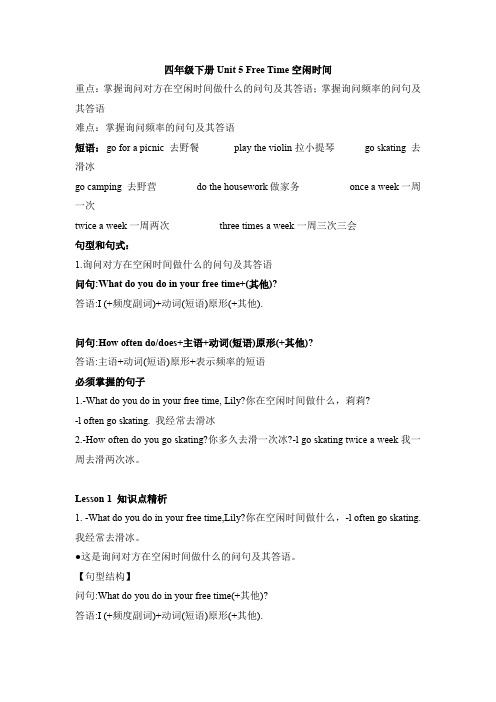
四年级下册Unit 5 Free Time空闲时间重点:掌握询问对方在空闲时间做什么的问句及其答语;掌握询问频率的问句及其答语难点:掌握询问频率的问句及其答语短语:go for a picnic 去野餐play the violin拉小提琴go skating 去滑冰go camping 去野营do the housework做家务once a week一周一次twice a week一周两次three times a week一周三次三会句型和句式:1.询问对方在空闲时间做什么的问句及其答语问句:What do you do in your free time+(其他)?答语:I (+频度副词)+动词(短语)原形(+其他).问句:How often do/does+主语+动词(短语)原形(+其他)?答语:主语+动词(短语)原形+表示频率的短语必须掌握的句子1.-What do you do in your free time, Lily?你在空闲时间做什么,莉莉?-l often go skating. 我经常去滑冰2.-How often do you go skating?你多久去滑一次冰?-l go skating twice a week我一周去滑两次冰。
Lesson 1 知识点精析1. -What do you do in your free time,Lily?你在空闲时间做什么,-l often go skating. 我经常去滑冰。
●这是询问对方在空闲时间做什么的问句及其答语。
【句型结构】问句:What do you do in your free time(+其他)?答语:I (+频度副词)+动词(短语)原形(+其他).例: -What do you do in your free time?你在空闲时间做什么? -I often read books.我经常看书。
-What do you do in your free time, Colin?你在空闲时间做什么,科林?-I often go for a picnic with my parents.我经常和我父母去野餐。
四年级下册英语复习资料-重点句型及语法人教版(新起点)

四年级下册第一单元:Our school一、对应词my ---yourI ---you our---your this --- that here ----thereyes----no come----go teacher----student boy----girl his---her二、知识点1、表示在几楼上,要用介词on,如on the first floor.在一楼。
The first表示第一的,序数词在使用时前面一定要加the,表示事物的排列顺序。
2、介绍离自己近的事物时用this is …., 介绍离自己比较远的事物时用that is…如:This is my computer. 这是我的计算机。
That is your computer.那是你的计算机。
3、how many…?多少?用来询问物品的数量有多少,后面只能跟名词的复数形式。
如How many books do you have?你有多少本书?4、当表示有一个时,名词的前面可以用a或者an.元音前用an , 辅音前用a.如an apple一个苹果an orange一个橙子 a pear 一个梨 a dog一只狗5、当用Is this…? Is that…?提问时,一般用肯定回答是:Yes, it is .否定是: No , it isn’t.三、句子:1、This is the teacher’s office.这是老师办公室。
2、That is my classroom.那是我的教室。
3、Go to the library. Read a story-book..去图书馆。
读故事书。
4、Is this the library? Yes, it is.这是图书馆吗?是的。
5、Is that the art room? No, it isn’t. the art room is on the second floor.(on the third; on the 4th; on the 5th…….)那是美术室吗?不是,美术室在二楼。
小学英语四年级下册各单元句型总结

四下各单元句型总结Unit 1 He looks like a cook1.A: W hich one / boy/ girl / man / woman is …? 哪一个是…?(在一定选择范围内)B: The one + 介词短语.e.g. A: Look at these children. Which one is Ben?B: The one with glasses and in a blue shirt (is Ben).2.A: W ho is …? ...是谁?B: He/She is + 人名.B: He/She is + 身份.e.g. A: Who is Ms White?B: She is our teacher.A: Who is the girl with long hair?B: She is Janet, my friend.Unit 2 She is very kind1.A: What is he/she like? 他/她是一个怎么样的人? (从性格、外貌、爱好等方面回答)B: He/ She has + 外貌特征B: He/ She is + 性格或外貌的形容词B: He/ She looks + 性格或外貌的形容词**look + 形容词,表示“看起来怎么样”;look like + 名词,表示“看起来像…”e.g. A: What is your brother like?B: He has a round face, two big eyes and a small nose. He looks/ is lovely. He likes eating.Unit 3 It’s time to get up1.A: What time is it? / What is the time? (现在是几点?)B: It’s + 时间点。
e.g. A: What time is it now?B: It is eight o’clock now.2.It is time for + 名词。
四年级下英语必备句型
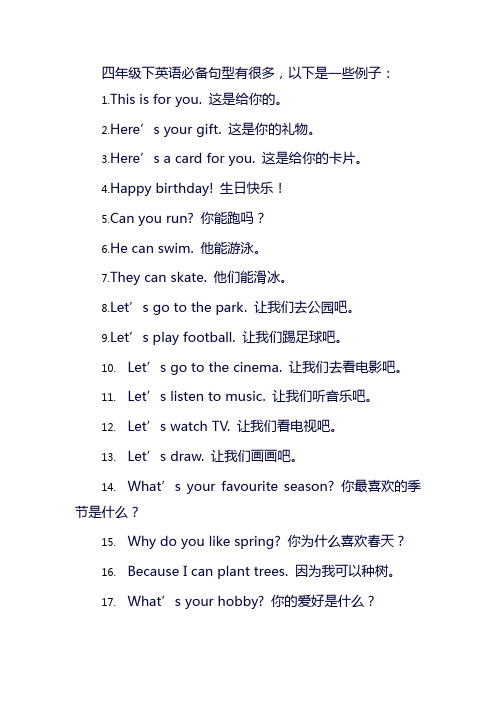
四年级下英语必备句型有很多,以下是一些例子:1.This is for you. 这是给你的。
2.Here’s your gift. 这是你的礼物。
3.Here’s a card for you. 这是给你的卡片。
4.Happy birthday! 生日快乐!5.Can you run? 你能跑吗?6.He can swim. 他能游泳。
7.They can skate. 他们能滑冰。
8.Let’s go to the park. 让我们去公园吧。
9.Let’s play football. 让我们踢足球吧。
10.Let’s go to the cinema. 让我们去看电影吧。
11.Let’s listen to music. 让我们听音乐吧。
12.Let’s watch TV. 让我们看电视吧。
13.Let’s draw. 让我们画画吧。
14.What’s your favourite season? 你最喜欢的季节是什么?15.Why do you like spring? 你为什么喜欢春天?16.Because I can plant trees. 因为我可以种树。
17.What’s your hobby? 你的爱好是什么?18.I like reading books. 我喜欢读书。
19.I like collecting stamps. 我喜欢集邮。
20.I like playing basketball. 我喜欢打篮球。
21.What’s the weather like today? 今天天气怎么样?22.It’s sunny today. 今天晴天。
23.It’s rainy today. 今天下雨。
24.It’s windy today. 今天刮风。
25.It’s snowy today. 今天下雪。
四年级下册英语第一单元重点句型

四年级下册英语第一单元重点句型1. What's your name? - My name is Tom.你叫什么名字? - 我叫汤姆。
2. How old are you? - I'm nine years old.你几岁了? - 我九岁了。
3. Where are you from? - I'm from China.你来自哪里? - 我来自中国。
4. What grade are you in? - I'm in Grade 4.你读几年级? - 我读四年级。
5. How many students are there in your class? - There are thirty students in my class.你们班有多少个学生? - 我们班有三十个学生。
6. What subject do you like? - I like English.你喜欢什么科目? - 我喜欢英语。
7. Who is your favorite teacher? - My favorite teacher is Miss Li. 你最喜欢的老师是谁? - 我最喜欢的老师是李老师。
8. What do you want to be when you grow up? - I want to be a doctor.当你长大后你想做什么? - 我想做一名医生。
9. Where is the library? - The library is next to the playground. 图书馆在哪里? - 图书馆在操场旁边。
10. What time do you have PE class? - I have PE class at 2 p.m. 你几点上体育课? - 我下午两点上体育课。
新起点四年级下册重点总结

Unit 1重点单词:between 在···之间restaurant 饭店bank 银行grocery 食品杂货店crossroads 十字路口neighbourhood 街坊,附近before在···之前leave 离开hospital 医院supermarket 超市重点短语:across from 在对面next to 紧邻across from 在对面next to 紧邻post office邮局turn left/right向左/右转go straight直行in front of 在···前面重点句型:Eg: Where is the bank?银行在哪?It’s between the supermarket and Sunday Park.它在超市和“Sunday”公园中间Eg: Excuse me. How can I get to the post office ?打扰一下,我怎样才能到邮局呢?Go straight and turn right at the first crossroads. It’s on your right.径直走然后在第一个十字路口右拐,邮局就在你右面。
Eg: where are you ?你在哪?I’m in front of the restaurant . 我在饭店前面。
音标:【ei】:train rain mail day say mayUnit 2重点单词:city 城市street 街道hotel 宾馆square 广场busy 忙碌的station(车)站place 地方thing 事,事物stay 停留central 中心的museum 博物馆dream 梦重点短语:sports centre体育中心buy toys 买玩具see a film 看电影go boating去划船take photos 照相重点句型:How can I get to the sports centre? 我怎样才能到运动中心啊。
- 1、下载文档前请自行甄别文档内容的完整性,平台不提供额外的编辑、内容补充、找答案等附加服务。
- 2、"仅部分预览"的文档,不可在线预览部分如存在完整性等问题,可反馈申请退款(可完整预览的文档不适用该条件!)。
- 3、如文档侵犯您的权益,请联系客服反馈,我们会尽快为您处理(人工客服工作时间:9:00-18:30)。
新起点四年级下册常用英语句型汇总
注意:画线部分的单词需能够替换单元内其他单词!
Unit 9: My community
单词:community building bank grocery store drugstore bookstore police station gas station coffee shop across from next to between cinema newspaper stand bakery turn left park hairdresser's restaurant zoo go straight turn right
句型:
1. Where is the bookstore?
It’s next to / across from the bank.
It’s between the bakery and the restaurant.
2. Excuse me. How can I get to the bakery?
Go straight. Turn right at the first crossing. It’s on your left.
Unit 10: My city
单词:
Place Things to do:
stadium watch a soccer match
museum see dinosaurs
university visit the library department store buy a skateboard
Tian’anmen Square fly a kite
gallery see an art show
句型:
1. Is there a park in your city?
Yes, there is. / No, there isn’t.
2. What are you going to do this weekend?
I’m going to Tian’anmen Square with my friends.
3. What do you want to do there?
I want to fly a kite.
Unit 11: Peoples and Countries
单词:
Country City Be famous for
China Beijing Tian’anmen Square
Japan Tokyo Cherry blossom
Canada Toronto CN Tower United States Los Angeles Disneyland France Paris Eiffel Tower United Kingdom London Big Ben Australia Sydney Opera House
句型:
1. Where do you come from?
I come from China.
2. Where do you live?
I live in Beijing.
3. What is your city famous for?
It’s famous for the Great Wall.
4. Where does Isuzu come from? Where does Edward come from? She comes from Japan. He comes from Canada.
5. Where does she live? Where does he live?
She lives in Tokyo. He lives in London.
Unit 13: Travel Plans
单词:
Place Things to do Transportation Beach (Hainan) swim By plane
Mount Tai see the sunrise By train
Shaolin Temple learn Wushu By train
West Lake take pictures By train
Safari park see wild animals By bus
Thailand see elephants By ship
Kunming see a flower show By plane
Tibet see the Buddha Palace By plane
句型:
1. Where do you want to go this summer vacation?
I want to go to Shaolin Temple with my parents.
2. What do you want to do there?
We want to learn Wushu there.
3. How do you want to go there?
By train.
Unit 14: My Hobby
单词:hobby read stories play computer games paint pictures collect dolls keep a diary collect stamps collect stickers knit sew make models collect coins play chess travel hike
句型:
1. What’s your hobby?
My hobby is read ing stories.
2. What do you think of it?
I think it’s fun.
3. What’s your mother’s hobby? What’s your father’s hobby? Her hobby is sing ing songs. His hobby is play ing chess.
4. What does she/he think of it?
She/He thinks it’s exciting.
Unit 15: Communication
单词:make a phone call send an e-mail send a short message write a letter mail a postcard pay phone cell phone
句型:
1. Do you often write letters to your friends?
Yes, I do. / No, I don’t.
2. May I speak to Peter, please?
This is Peter speaking.
3. Would you like to go to the park with me?
Sure.
4. I want to send an e-mail to my friends.。
